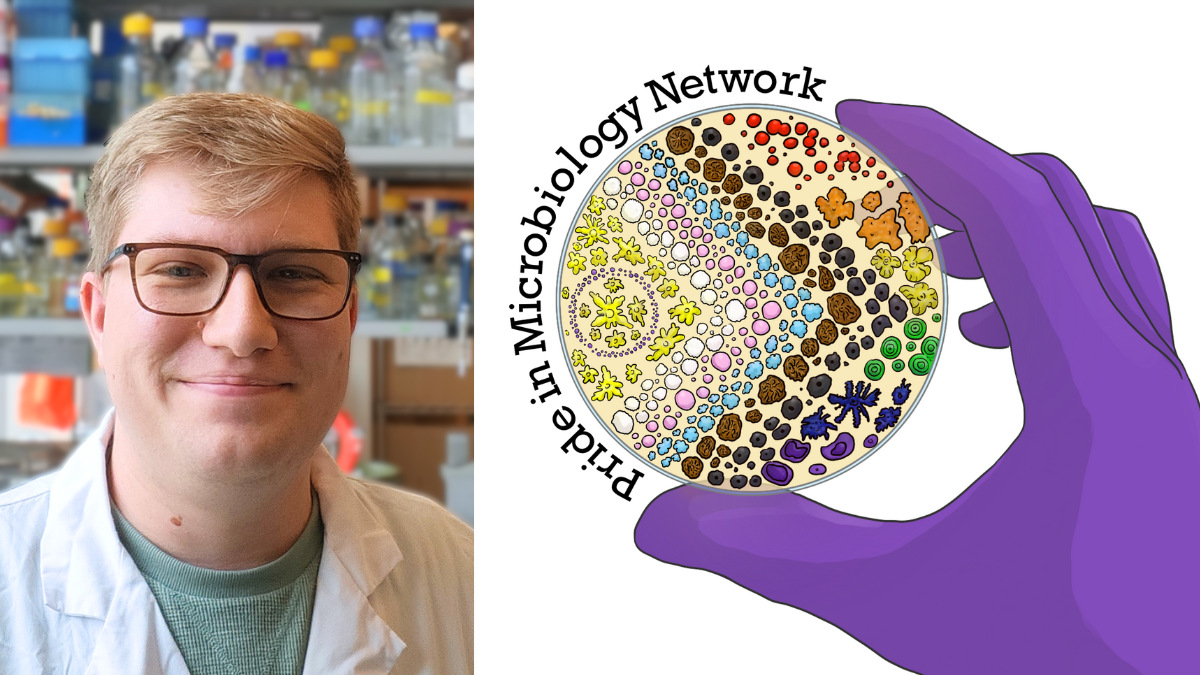Logo credit: Karina Gisèle Mac Si Hone
June 5, 2024
By Betty Zou
June is a time to celebrate the contributions of the LGBTQ+ community, but the pivotal work of supporting and empowering LGBTQ+ people to achieve their potential continues throughout the year thanks to people like Landon Getz.
Getz is a postdoctoral fellow in the lab of Karen Maxwell, an associate professor of biochemistry at the University of Toronto, and a long-time advocate for LGBTQ+ people in science, technology, engineering and mathematics (STEM).
As a PhD student at Dalhousie University, he founded Queer Atlantic Canadian STEM, a visibility and community-building project aimed at enhancing diversity, equity and inclusion for queer folks in STEM across the Atlantic provinces. Last year, he launched Pride in Microbiology along with co-founders Bruno Francesco Rodrigues de Oliveira and Edel Pérez-López.
“The idea behind Pride in Microbiology is to create a professional development and mentorship network to connect queer microbiologists with one another to start building the community that I think we desperately want and need,” says Getz, who is also the GSK-EPIC Postdoctoral Fellow in Antimicrobial Resistance.
With over 100 members from across the globe, the initiative seeks to enhance justice and belonging among LGBTQ+ people studying or working in microbiology in academia and industry.
Getz notes that “the data is pretty clear that LGBTQ+ people in STEM face particular barriers and they occasionally feel unsafe at work.”
According to a 2021 study that surveyed over 25,000 US-based STEM professionals, including 1,006 who identified as LGBTQ, LGBTQ STEM professionals are 30 per cent more likely to experience harassment at work compared to their non-LGBTQ peers. They are also more likely to experience other workplace-related challenges, such as professional devaluation and career limitations, and to intend to leave STEM.
To counter these challenges, Pride in Microbiology created a platform where LGBTQ+ microbiologists can connect directly with each other to share their experiences and ideas related to workplace discrimination and advocacy, and to establish new research collaborations. The group also showcases high-impact research by LGBTQ+ microbiologists and microbiology-related studies that are relevant to the queer community.
Last November, Pride in Microbiology hosted a roundtable discussion on creating safer spaces for the 2SLGBTQIA+ (two-spirit, lesbian, gay, bisexual, transgender, queer, intersex, asexual, plus) microbiology community in academia and beyond. They also recently launched regular virtual coffee hours to facilitate networking and community-building among its members.
“The number of spaces for queer people in STEM is almost nonexistent,” says Getz. “It’s really rejuvenating to attend these events and see people like me doing incredibly cool science and to connect with other LGBTQ+ people in STEM.”
While Canada is seen by many as a progressive country in supporting LGBTQ+ rights, he notes that the queer community is often left out of many equity, diversity and inclusion (EDI) initiatives related to academic funding and hiring because those initiatives are based on the Federal Contractors Program and the Employment Equity Act. Both policies only identify four equity-deserving groups — women, Indigenous peoples, persons with disabilities and members of visible minorities — thereby excluding the queer community from many institutional EDI initiatives.
Looking ahead, Getz wants to see Pride in Microbiology expand to offer scholarships that enable queer microbiologists to travel and attend conferences, and to build a formal mentorship program bringing together junior and more established scientists.
He also envisions the initiative becoming a knowledge hub for people who want to learn more about the challenges facing LGBTQ+ people in STEM and ways they can help. “It often falls on individuals to educate the larger community about what the issues are,” says Getz. “It would be nice if we could build resources together as a way to relieve the burden on those constantly being asked for information.”
As he continues to advance his research and community-building and advocacy work, Getz is optimistic about the progress that’s been made to make science a more inclusive and welcoming place.
“Initiatives like Pride in Microbiology remind us that we belong here and that we should continue to this work to make the situation better for all of us.”
To learn more about Pride in Microbiology, visit their website or follow them on X and Instagram.


